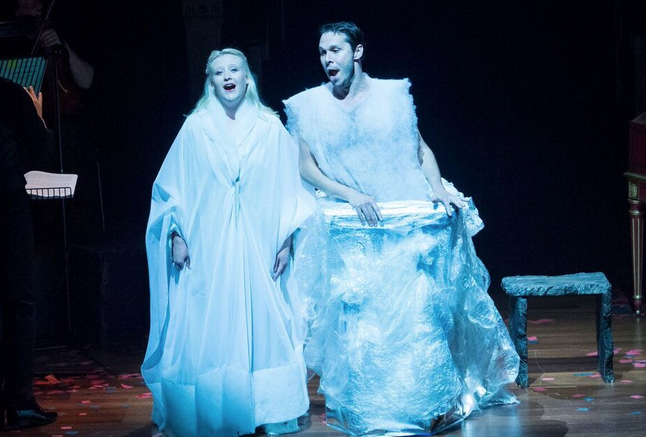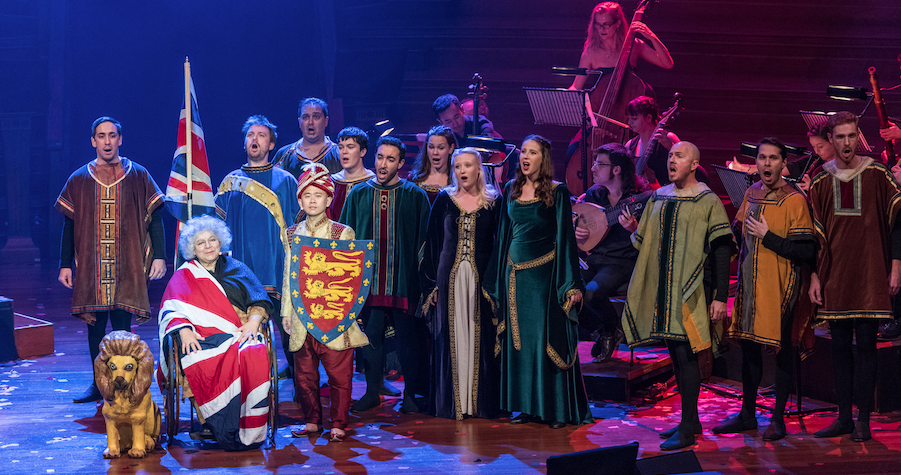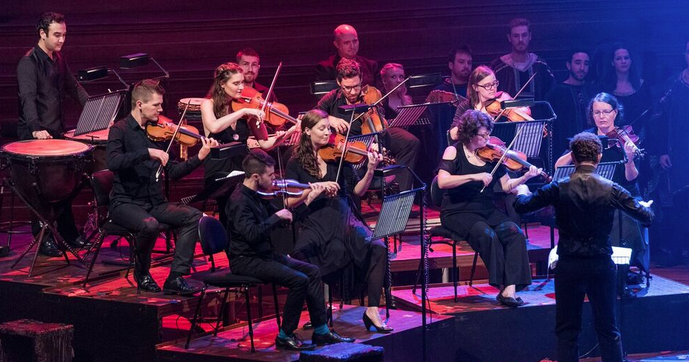★★★★☆ Miriam Margolyes rules the waves as Brisbane defrosts Purcell’s genius.
City Hall, Brisbane
April 11, 2016
The scene in King Arthur where love thaws the frosty genius of the British Isles is without doubt one of the most original pieces of dramatic writing of the entire Baroque. With juddering vocals and quivering strings, Henry Purcell paints a picture and tells a story as compellingly as Handel, Vivaldi or Rameau ever did. Yet sadly his small store of stage works are seldom seen, often hampered by being locked into performances of unwieldy post-Restoration plays. King Arthur (or the British Worthy) is one of his two semi-operas, weighed down by John Dryden’s windy text, which tells a tale frustratingly unrecognisable to aficionados of Britain’s legendary monarch of the Round Table. With two and a half hours of music, a full outing would last a bum-numbing five hours plus, so it was a smart move on the part of Brisbane Baroque to fillet the play and focus on Purcell’s supremely tuneful music and a score that contains more earworms than any contemporary continental opera.
 Kiandra Howarth and David Greco
Kiandra Howarth and David Greco
It was clear from the exit chitter-chatter that not everybody ‘got’ Rodney Fisher’s idea for the show. The faux medieval-cum-pantomime feel of the costumes and a certain rough and ready quality to the staging would have benefitted from more of a set up. It was left to the audience to either deduce they were watching some kind of ‘Empire Day’ village pageant or assume an element of make-do was at work. If you went with it though (and I did), thanks to the high musical standards, it was a bit like sitting through the best school play you’ve ever seen.
Dryden’s tale tells of Arthur’s lengthy attempts to rescue his beloved Emmeline (the beautiful but blind daughter of the King of Cornwall) from his Saxon enemy, King Oswald. And as each monarch has his resident wizard, there’s plenty of magic and skulduggery to hamper the hero’s quest, offering Purcell ripe opportunities for a series of musical divertissements. Fisher had trimmed the text to (almost) the bare minimum, leaving it up to just two actors to tell the tale. The engaging Aljin Abella, done up like Oberon’s Indian boy, delivered most of the narrative with a chirpy energy that was highly infectious. Meanwhile, mistress of a thousand voices Miriam Margolyes was called upon to deploy a sizable percentage of her formidable repertoire, from her perch in the City Hall organ loft. An actor and entertainer of the first order, she kept the audience engrossed with a witty array of virgins, sorcerers, rustics, hags and kings, saving the best ‘til last by being wheeled onto the platform as Britannia complete with shield and plastic lion.

With musical standards this high it seems harsh to single out any for special praise, but conductor Brett Weymark deserves a medal for conducting Purcell’s long and multi-faceted score with such style and panache. Tempi were perfectly judged, and he instinctively knew just when to let his forces off the leash and when to rein them in. The Orchestra of the Antipodes obeyed him to the nth degree, marvellously nuanced, with lean-toned strings, bubbling oboes, stirring trumpets and drums and Josep Maria Martí Duran exhilarating on lute and baroque guitar.
Leading the vocal delights were David Greco and Kiandra Howarth (newly returned from her Covent Garden triumphs) who delivered a blockbuster Frost Scene. Greco’s emergence from a wheelie bin drew respectful titters as his rich baritone ascended from the depths, while his beautifully decorated delivery and magnetic acting performance were a perfect combination. Howarth was silver-toned here and in a variety of other roles, which included delivering the famous Fairest Isle. Jacqueline Porter was in magnificent voice in the other soprano solos, her bell-like tone and exemplary diction lending focus to the tripping Hither, This Way as well as sultry and sensuous in Two Daughters of this Aged Stream (in ravishing duet with Howarth). Tenor Nicholas Scott impressed again delivering a heroic Come, if You Dare, a beautifully phrased and decorated How Blest are Shepherds, and a rollicking Your Hay it is Mowed (otherwise known as the bumpkins’ national anthem).
 Brett Weymark and half of the Orchestra of the Antipodes
Brett Weymark and half of the Orchestra of the Antipodes
The ensemble singers were impressively disciplined, especially considering they had their backs to the conductor throughout. Without any serious weak links, they sang with passion and grace, and contributed some lovingly crafted solos, duets and trios. The great Act IV Passacaglia (How Happy the Lover) was rightly the centrepiece of the opera, while their gripping Frost Scene came complete with entertaining sneezes.
As full and decent a staging as this is another feather in the cap of Brisbane Baroque and a welcome reminder that the Baroque is more than just Bach, Handel and Vivaldi. More Purcell next year, please!











Comments
Log in to join the conversation.